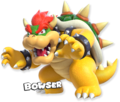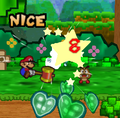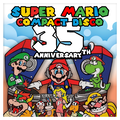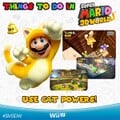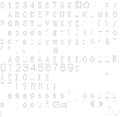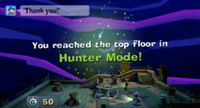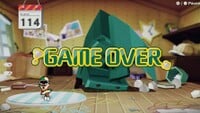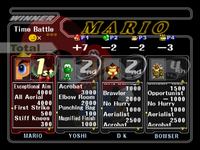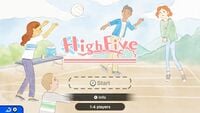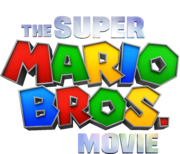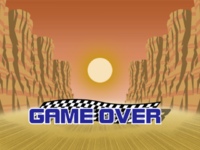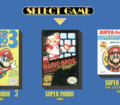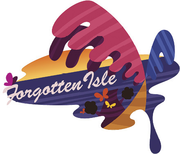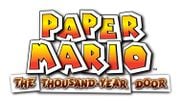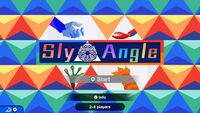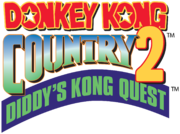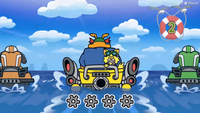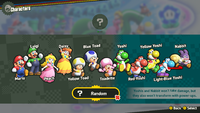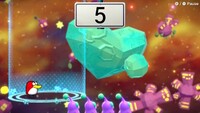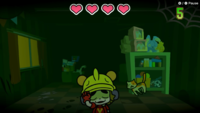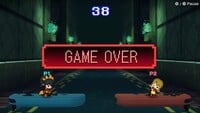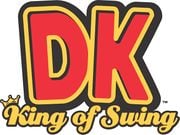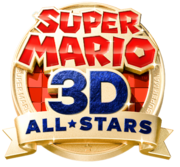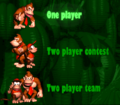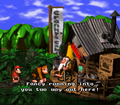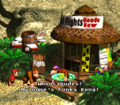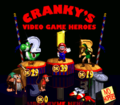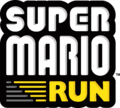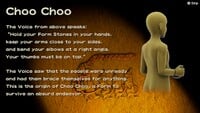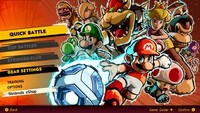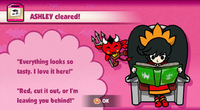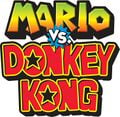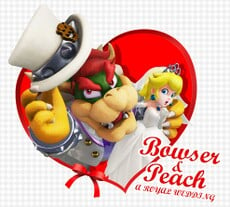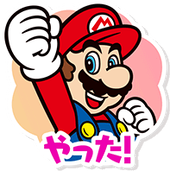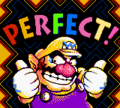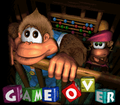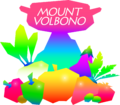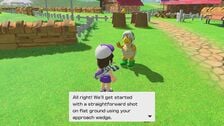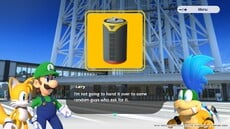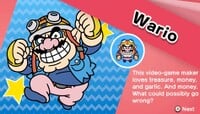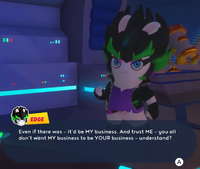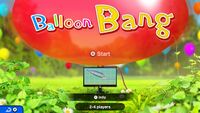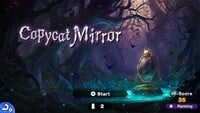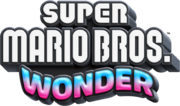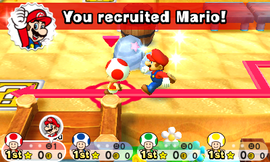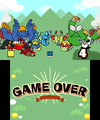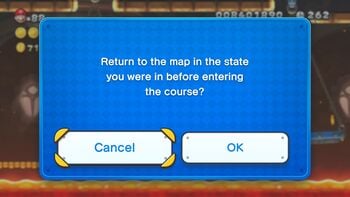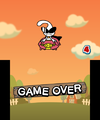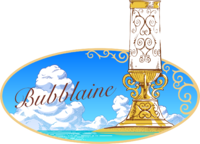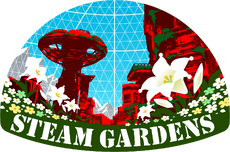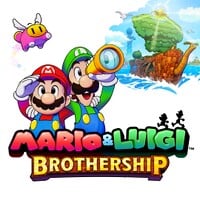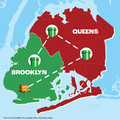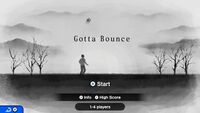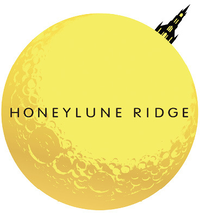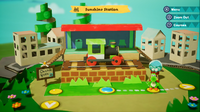List of fonts
It has been requested that more images be uploaded for this article. Remove this notice only after the additional images have been added. Specific(s): Illustrate all fonts listed
This is a list of typefaces used in games and related media within the Super Mario franchise.
Classic Super Mario typeface
The first Super Mario font is an uneven sans serif typeface designed by Nintendo in 1988. It is used for the logos and, later, interfaces of Super Mario games from Super Mario Bros. 3 to Mario & Sonic at the London 2012 Olympic Games.
Though mostly the same, a second version of the font was designed following the release of Super Mario 64, which would take over as the primary version from then on. It lacked a fully defined character set, which led to many different interpretations. In particular, the font does not have a consistent design for Japanese hiragana, katakana, or kanji. This remained the case for the font even after the overhaul, likely inciting the shift over to the modern Super Mario font.
Used in tandem with other fonts throughout the 2000's, it was fully replaced with the modern font with the release of Super Mario 3D Land, being last seen on the logo for Mario & Sonic at the London 2012 Olympic Games, albeit an early logo for Paper Mario: Sticker Star used a design partially based on this typeface before being changed to the modern Super Mario typeface for the final release.
Modern Super Mario typeface
The modern Super Mario typeface is an uneven sans serif typeface designed by Nintendo in the early 2010s. It was experimented with by Nintendo in the lead up to the release of the Nintendo 3DS and Wii U, with the first use of the modern font appearing in the spine art of Super Mario Galaxy 2. Early versions appeared in games such as Mario Sports Mix, featuring a character set closer to the classic font. The font in its current form was officially introduced with the release of Super Mario 3D Land in 2011 and has since become the singular Super Mario typeface, used for logos, menus, HUDs, and other text across the Super Mario franchise.
The font is officially called "MARIO Font" and was created in collaboration with Fontworks, a foundry whose fonts are often used in Nintendo games. Unlike the previous font, this font has full character sets for hiragana and katakana, as well as some kanji and Cyrillic characters. The font has been revised at least three times; the latest revision of the font is version 3.203, revised on August 20, 2019.[1]
Logo for Super Nintendo World
English/international logo for The Super Mario Bros. Movie
Lettering seen in the May 2023 game update trailer for the Game Boy Advance - Nintendo Switch Online application[2]
Picture of Mario in which his name, using this typeface, is also shown
Donkey Kong's name
Luigi's name
Cat Mario's name
Toad's name
Picture of Bowser in which his name, using this typeface, is also shown
Peach's name
Modern Super Mario Bros. typeface
The modern Super Mario Bros. typeface is first seen in New Super Mario Bros.. This is based on the in-game logo for Super Mario Bros., which was in turn used as the logotype for the Super Mario All-Stars version of Super Mario Bros., as well as Super Mario Bros. Deluxe. It is geometrical with vertical stems with circular joints for shapes such as "A" and "M" and horizontal strokes that end before meeting left-hand vertical stems. Super Mario Bros. Wonder introduces a lowercase set of characters for this typeface.
Other than every New Super Mario Bros. game logo as well as Puzzle & Dragons: Super Mario Bros. Edition and Super Mario Run, it is also seen in Mario Super Sluggers and Super Mario Bros. Wonder for display text, as well as in The Super Mario Bros. Movie for the Super Mario Bros. Plumbing logo.
The preliminary logo for New Super Mario Bros. used a design drawn from Super Mario Bros. Deluxe
Classic HUD typeface
This design was used from Super Mario 64 until Mario and Sonic at the London 2012 Olympic Games for the Nintendo 3DS, appearing throughout games on the Nintendo 64, GameCube, and Wii. Some of its distinct features are the pointed, obelisk-shaped "A", the flat, wide "E", and the overall stocky, top-larger-than-bottom measures, giving it a more whimsical appearance if compared to earlier Super Mario typefaces, which were designed in the opposite way.
This typeface was primarily used for in-game text outside of dialogue (i.e HUDs and menus). Given the lack of standardization on the first Super Mario typeface, this one was also often used for placeholder logos, at times when new characters for the first font could not be drawn. It was also used for the logo of Super Mario Sunshine.
Yoshi Topsy-Turvy Japanese logo
Preliminary logo for Super Mario Galaxy
Paper Mario typeface
A design similar to the classic HUD design above, used for in-game display text in Paper Mario games up to Paper Mario: Sticker Star.
The Letter "p", an item in Paper Mario: The Thousand-Year Door
Super Mario Maker typeface
The Super Mario Maker font is a geometric sans serif typeface first designed by Nintendo in 2015. It is used for the interface in Super Mario Maker, Super Mario Maker for Nintendo 3DS, and Super Mario Maker 2. The initial variant of the font was titled "MARIO30th" and lacked lowercase characters. It was revised in 2018 to include lowercase letters; this new version is named "MARIOMAKER". The latest revision of the font is version 1.3, revised on November 28, 2018.[1]
Super Mario 256
Super Mario 256 is a fanmade font designed to replicate the modern Super Mario typeface, and was created by DaFont user fsuarez913.[3] The typeface was first published online in 2012, and quickly became widespread.[4] Compared to the font it imitates, Super Mario 256 is slightly bolder and wider, and several characters are drawn at different angles.
Despite its nature as an unofficial fan project, Super Mario 256 has made its way into official media on multiple occasions. In particular, the covers for Super Mario Manga Mania and Super Mario Compact Disco – 35th Anniversary Edition, the LEGO Super Mario set "Nabbit at Toad's Shop", the logo for LEGO Super Mario Goal and the in-game score, a few social media advertisements for Super Mario 3D World and the Nintendo Switch remake of Super Mario RPG, and the Japanese Square Enix strategy guide for Super Mario RPG on Nintendo Switch feature the typeface.[5]
Mario Party Textbox
Mario Party Textbox is used for the interface in the English version of Mario Party.
Mario Party Textbox FR/DE
Mario Party Textbox FR/DE is used for the interface in the French and German versions of Mario Party.
Mario Party 2/3 Textbox
Mario Party 2/3 Textbox is, as the name implies, used for the interface in Western versions of Mario Party 2 and 3.
Mario Party 4-7 Textbox
Mario Party 4-7 Textbox is, as the name implies, used for the interface in Western versions of Mario Party 4, 5, 6, and 7, as well as Dance Dance Revolution: Mario Mix and the European version of Mario Party 8.
Mario Party Hudson
Mario Party Hudson is used for large text in all Hudson Soft-developed Mario Party installments.
Rabbids typeface
A typeface internally named Rabbids is used for the interface in Mario + Rabbids Sparks of Hope for display text.
Licensed and other external designs
Ad Lib
Ad Lib is an uneven sans serif typeface designed by Freeman Craw for the American Type Founders, first released in 1961.[6] It is used for the interface in the following games:
It is also used in the logo for WarioWare, Inc.: Mega Party Game$! as well as in the instruction booklets for Mario Party 4 and 5.
Anito
Anito (アニト Anito) is a rounded sans serif typeface designed by Yutaka Satō[7] for Type Labo, first released in 2001.[8] It is used for the interface in Super Mario Maker. The typeface was also used in the tentative logo for that game during E3 2014, then named Mario Maker.
Antique Olive
Antique Olive is a sans serif typeface designed by Roger Excoffon for the Fonderie Olive, first released between 1962 and 1966.[9] It is used in the logo for Mario Tennis: Ultra Smash.
Aokane
Aokane (あおかね Aokane) is a rounded sans serif typeface designed by Yoshiharu Ōsaki for Fontworks, first released in 2015.[10] It is used for the interface in Tetris 99, the text in Mona and Penny's stages in WarioWare: Get It Together!, and text in the Pool-Party Panic stage in WarioWare: Move It!,
A-OTF Folk Pro
A-OTF Folk Pro is a sans serif typeface from Morisawa. It is used for the interface in Super Smash Bros. Melee, Super Smash Bros. Brawl, and Super Smash Bros. for Nintendo 3DS/Wii U.
Arial
Arial is a sans serif typeface designed by Patricia Saunders and Robin Nicholas for Monotype, first released in 1981.[11] It was used for the HUD of the E3 preview of New Super Mario Bros. Wii.
Arial Black is used for certain text in Super Smash Bros. Melee.
Baby Pop
Baby Pop (ベビポップ Bebi Poppu) is a Point of Purchase typeface from Fontworks, first released in 2015.[12] It is used for text in the Variety Towers and the logo for High Five in WarioWare: Get It Together!.
Bauhaus
Bauhaus is a sans-serif typeface designed by Joe Taylor for Fotostar, first released in 1969.[13] It is used in the logo for amiibo, as well as in the logos for the following games:
Berlin Sans
Berlin Sans is a sans serif typeface designed by David Berlow, Lucian Bernhard and Matthew Butterick for the Font Bureau and FontFont, first released in 1992.[14] It is used in its heavier variants for the KONG Letters in Donkey Kong Country games starting with Donkey Kong Country Returns.
Blackplotan
Blackplotan is a sans-serif typeface from 7NTypes. It is used in the logo for The Super Mario Bros. Movie.
Boss
Boss is a sans serif typeface from SoftMaker. It is used in WarioWare: D.I.Y. Showcase for text in Dribble & Spitz's stage, although with a modified "G", which features a left spur in the game.
Broadway Com Roman
Broadway Com Roman is a sans serif typeface from Linotype. It is used for the display text of "SELECT GAME" in Super Mario All-Stars and the year headings in Super Mario 3D All-Stars on the game-selection screens.
Brush Script
Brush Script is a script typeface from American Type Foundry. It is used in Super Mario Odyssey on the Forgotten Isle sticker.
Cancun
Cancun is a sans-serif typeface from Corel. It is used in the logo for Paper Mario: The Thousand-Year Door.
Carat
Carat (カラット Karatto) is a font from Fontworks used for text in the WarioWatch stage of WarioWare Gold, as well as in Wario's and Dribble & Spitz's levels and in the Play-o-Pedia in WarioWare: Get It Together!, and the logo for Galactic Conquest in WarioWare: Move It!.
Chiaro
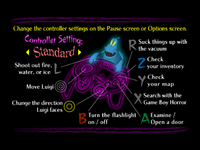
Chiaro (キアロ Kiaro) is a sans serif typeface from Fontworks. It is used for controller setting texts in Luigi's Mansion.
Comet
Comet (コメット Kometto) is a sans serif typeface from Fontworks. It is used for the logo for Sly Angle in WarioWare: Get It Together! and the text in the Volcano Wario stage in WarioWare: Move It!.
Comic Sans
Comic Sans is a sans-serif typeface designed by Vincent Connare for Microsoft, first released in 1994.[15] It is used on the "Welcome" sign in the Mushroom Castle area in Super Mario RPG for the Nintendo Switch.[16]
Compacta
Compacta is a sans-serif typeface from Letraset. It is used for the logo for Donkey Kong Country 2: Diddy's Kong Quest.
Cuckoo
Cuckoo (カッコウ Kakkō) is a Point of Purchase typeface from Fontworks. It is used for text in Dribble & Spitz's stage in WarioWare: Move It!.
DF Gothic
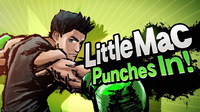
DF Gothic (DFゴシック体 DF Goshikku-tai) is a sans serif typeface from Fontworks. It is most prominently used in Super Smash Bros. games, with the exception of Ultimate. In the original Super Smash Bros., it is used for pre-match loading screens in the 1P Game, as well as unlock messages; in Melee and Brawl, it is used for How to Play; and in Super Smash Bros. for Nintendo 3DS/Wii U, it is the primary large text font.
It is also has minor usage in Mario Kart 8 and Mario Kart 8 Deluxe on the Bullet Bill Speed Trials logo, which uses its Ultra Heavy (DFP超極太ゴシック体) font.
DF UD Gothic
DF UD Gothic (DF UDゴシック体 DF UD Goshikku-tai) is a Universal Design sans serif typeface from Dynacomware. It is used for the interface in Super Mario Maker 2 for the Japanese language.
DFP Gyō Kaisho
DFP Gyō Kaisho (DFP行楷書 DFP Gyō Kaisho) is a script typeface by DynaFont. Designed to replicate the brush strokes of Japanese calligraphy, it is used for text from the Temple of Form in WarioWare: Smooth Moves in Japanese and languages using the Latin script.
DIN 2014
DIN 2014 is a sans serif typeface from ParaType. It is a variant of DIN 1451 and is used for the interface in Super Mario Bros. Wonder and Nintendo World Championships: NES Edition.
DNP Shuei KakuGothic
DNP Shuei KakuGothic (DNP 秀英角ゴシック DNP Shūei-kaku Goshikku) is a sans serif typeface from Fontworks. It is used for text in Dribble & Spitz's stage in WarioWare: Get It Together!.
Dom Casual
Dom Casual is a typeface from American Type Founders. It is used both in The Super Mario Bros. Super Show! and the Donkey Kong Country television series (in its bold variant) for general text, including title cards and credits information. It is also used in the Super Mario World television series for credits only.
Dot Gothic12
Dot Gothic12 (ドットゴシック 12 Dotto Goshikku 12) is a pixelated sans serif typeface from Fontworks. it is used for the interface in the following games:
- WarioWare: Move It!
- Princess Peach: Showtime!
Dot Gothic16
Dot Gothic16 (ドットゴシック 16 Dotto Goshikku 16) is a pixelated sans serif typeface from Fontworks. It is used for text in 9-Volt's stage in WarioWare: Get It Together!.
Eclat
Eclat is a script typeface from Image Club. It is used for the European/Australasian logo for DK: King of Swing.
El Grande
El Grande is a sans-serif typeface from The Font Bureau. It is used for the North American logo for Mario & Luigi: Dream Team.
Eras
Eras is a serif typeface from ITC. Eras Bold is used in Super Smash Bros. Melee for the ordinal number suffixes on the winner screen.
FF CrashBangWallop
FF CrashBangWallop is a sans-serif typeface from FontFont. It is used for the North American logo for Mario Hoops 3-on-3.
FF Mark
FF Mark is a sans serif typeface from FontFont. It is used for the logo for Super Mario 3D All-Stars. It has also been largely used as the main typeface for Nintendo's branding since the release of the Nintendo Switch, such as the logo for Nintendo Switch Online. It is also used for the interface for Nintendo World Championships: NES Edition.
Futura
Futura is a sans serif typeface from Bauersche Gießerei. It is used for interface text in Mario + Rabbids Kingdom Battle and display text in Mario + Rabbids Sparks of Hope in its Condensed Extra Bold variant. In Mario Tennis Aces it is used for some interface text and for light displays on stadium courts.
It is present on the boxart logos for Mario is Missing! (Extra Bold) and Mario's Time Machine (Extra Bold and Extra Bold Condensed), and on the logo for Mario Slam Basketball.
GigaG
GigaG (ギガG GigaG) is a sans serif typeface from Visual Design Laboratory (視覚デザイン研究所 Shikaku Dezain Kenkyūjo). It is used for the interface in Mario Golf: Super Rush for the Japanese language.
Gill Sans
Gill Sans is a sans serif typeface from Monotype. It is used for the KONG Letters in the original trilogy of Donkey Kong Country games.
Gill Kayo, a heavy relative of Gill Sans, is used extensively in Donkey Kong Country for interface text (including the "Nintendo presents" splash screen) as well as in-universe scenery text. In Donkey Kong Country 2: Diddy's Kong Quest, it is used once again for scenery signs and also for the Cranky's Video Game Heroes screen.
The Gill Sans MT Pro Display Extra Bold font is used for the logo for Super Mario Run.
Cranky's Cabin sign
Funky's Flights sign
Gospel
Gospel (ゴスペル Gosuperu) is an uneven serif typeface from Fontworks. It is used for text in the Variety Tower stages and Copycat Mirror in WarioWare: Move It!.
Gotham
Gotham is a sans-serif typeface from Hoefler&Co. Gotham Ultra is used for the logo for Super Mario 3D All-Stars.
Greco
Greco (グレコ Gureko) is a serif typeface from Fontworks. it is used as a system font on the Wii.
Handel Gothic
Handel Gothic is a sans serif typeface originally from FotoStar. Handel Gothic with a straight leg on "R", a straight lower leg on "k", and a double-v "w", modified with a short line on the top left of the "1", is used for the interface in Luigi's Mansion 3 for Western languages.
Handel Gothic also is used in the logo for Mario Power Tennis and for the "Mario Tennis" logo displayed on courts in Mario Tennis: Ultra Smash.
Helvetica Neue
Helvetica Neue is a sans serif typeface from Linotype. It is a variant of Helvetica and is used in The Super Mario Bros. Movie for street names in the map and the on-screen text both seen in the Super Mario Bros. Plumbing commercial.
Highway Gothic
Highway Gothic is a sans serif typeface developed by the United States Federal Highway Administration (FHWA). It is used for text in The Super Mario Bros. Movie.
Hourei
Hourei (豊隷 Toyo隷) is a script typeface from Fontworks. It is used in WarioWare: Move It! for the text for the Forms.
Humming
Humming (ハミング Hamingu) is a rounded sans serif typeface from Fontworks. It is used for the interface in the following games:
- Mario & Luigi: Dream Team
- Princess Peach: Showtime!
Impact
Impact is a sans-serif typeface from Stephenson Blake. It is used for the logo for Mario Tennis: Power Tour.
It is also minorly used in Donkey Kong Country 2 for the Game Boy Advance for the Cranky's Video Game Heroes banner text.
ITC American Typewriter
ITC American Typewriter is a serif typeface used for the logos for the following games:
- Mario's Picross
- Dr. Mario: Miracle Cure (ITC American Typewriter Pro Bold)
ITC Bookman
ITC Bookman is a serif typeface used in The Adventures of Super Mario Bros. 3 for episode title cards, in its Bold variant.
ITC Grizzly
ITC Grizzly, a variant of ITC Kabel, is a sans serif typeface used in Mario Strikers: Battle League for display text.
ITC Kabel
ITC Kabel is a sans serif typeface used in Game & Wario in its Ultra variant for display as well as body text. In WarioWare Gold, it is used once again for microgame commands, like in Game & Wario's Gamer.
ITC Kabel is also used prominently in Super Smash Bros., being present also on the game's logo. It is also present on the logos for Mario Kart 64 (Medium), Mario vs. Donkey Kong games (Bold) and Mario Golf: Toadstool Tour (Ultra). Additionally, it is used in the instruction booklets for Super Mario 64 and Mario Party.
ITC Kabel Ultra was also used for the logo for the unreleased English version of Nintendo Puzzle Collection.
Kafu Techno
Kafu Techno (花風テクノ Hanafū Tekuno) is a sans serif typeface from Fontworks. It is used in WarioWare: Get It Together! for Dr. Crygor's stage, and WarioWare: Move It! for text in the Volcano Wario stage, Megagame Muscles, and the logo for Dirty Job.
Khamden Script
Khamden Script is a script typeface from Solidtype. A modified version is used for Bowser and Princess Peach's wedding posters seen in Super Mario Odyssey.
Kurokane
Kurokane (くろかね Kurokane) is a sans serif typeface from Fontworks. It is used for the sticker text in Mario Party Superstars for the Japanese language. It is also widely used in WarioWare games starting from WarioWare Gold, as well as in Rhythm Heaven Megamix.
Kyo Geki
Kyo Geki (京劇体 Kyō Geki-tai) is an uneven sans serif typeface from DynaComware. It is used for the interface in Luigi's Mansion: Dark Moon for kana and kanji and in the Japanese and American versions of Mario Party 8.
LineG
LineG (ラインG RainG) is a sans serif typeface from Visual Design Laboratory. It is used for the interface in Super Mario Bros. Wonder for the kanji.
Lithos
Lithos, in its Black variant, is employed for certain display text in Donkey Kong Country 3: Dixie Kong's Double Trouble!, Donkey Kong Land III and Wario Land 3 and for general interface text in Donkey Kong 64. Mario's Game Gallery also features Lithos Black for the game's title on the main menu, and Super Mario 64 uses it for the "COURSE" text on course icons.
More recently, it has been used for the logo of the Mario & Sonic games (once again in the form of Lithos Black), and has appeared in Super Mario Odyssey as part of the Mount Volbono sticker.
Used for the "OLYMPIC GAMES" text in the logo for Mario & Sonic at the Olympic Games
LogoG
LogoG (ロゴG RogoG) is a sans serif typeface from Visual Design Laboratory. Its Latin characters are similar to Eurostile. It is used for the interface in Super Mario Bros. Wonder for the kana.
Logona
Logona (ロゴナ Rogona) is a sans serif typeface from Visual Design Laboratory. Its Latin characters are similar to Eurostile. It is used for the interface in Mario Golf: Super Rush for the Japanese language and the interface in the Nintendo Switch remake of Super Mario RPG for display text.
Matisse
Matisse (マティス Matisu) is a serif typeface from Fontworks. It is used for text in Rising Star in WarioWare: Get It Together! and text in Jimmy T.'s stage in WarioWare: Move It!.
Mystery
Mystery (ミステリ Misuterī) is an uneven serif typeface from Fontworks. It is based on Matisse (マティス Matisu), a serif typeface also from Fontworks. It is used for the location name HUD in Luigi's Mansion and text in 9-Volt's stage in WarioWare: Move It!.
Neo Sans
Neo Sans is a sans serif typeface from Monotype. It is used for the interface in Mario & Sonic at the Olympic Games Tokyo 2020 for Western languages.
Neuland
Neuland is a typeface from Klingspor. It is used in Donkey Kong Country Returns and Donkey Kong Country: Tropical Freeze for display text, such as menu titles and level titles on the map and loading screens, as well as menu text in Returns.
New Cezanne
New Cezanne (ニューセザンヌ Nyū Sezan'nu) is a sans serif typeface from Fontworks. It is used in WarioWare: Get It Together! and WarioWare: Move It! for display text.
News Gothic
News Gothic is a sans serif typeface from Morris Fuller Benton. It is used in Mario Strikers: Battle League for body text.
New Rodin
New Rodin (ニューロダン Nyū Rodan) is a sans serif typeface from Fontworks. Its Latin characters are similar to Eurostile. It is used for the interface in the following games:
- Mario & Luigi: Dream Team
- Mario Kart 8
- Mario & Luigi: Paper Jam
- Mario Kart 8 Deluxe
- Mario & Luigi: Superstar Saga + Bowser's Minions
- Mario Tennis Aces
- Super Mario Party
- Mario & Luigi: Bowser's Inside Story + Bowser Jr.'s Journey
- Mario Kart Tour
- Mario Kart Live: Home Circuit
- Mario Golf: Super Rush (Western languages)
- WarioWare: Get It Together!
- Mario Party Superstars
- Nintendo World Championships: NES Edition
- Super Mario Party Jamboree
Noyh
Noyh is a sans serif typeface from Typesketchbook. It is used in Mario + Rabbids Sparks of Hope in its R Medium variant for body text.
Optima
Optima is a sans-serif typeface from Linotype. It is used for the logo for Princess Peach: Showtime!. It is also minorly seen in Super Mario Odyssey, where it is featured in the Tostarena sticker.
PalRamune
PalRamune (パルラムネ ParuRamune) is a Point of Purchase typeface from Fontworks. It is used for the logo for Balloon Bang in WarioWare: Get It Together! and text in Mona's stage in WarioWare: Move It!.
PalRetron
PalRetron (パルレトロン ParuRetoron) is a font from Fontworks used for the logos for Medusa March and Copycat Mirror in WarioWare: Move It!.
PiePie
PiePie is a sans-serif typeface from Dharma Type. It is used for the logo for WarioWare: Get It Together!
Pop Fury
Pop Fury (Popフューリ Pop Fyūri) is a Point of Purchase typeface from Fontworks. It is used for the controller setting label and the letters labeling the controller buttons in Luigi's Mansion.
Pop Happiness
Pop Happiness (Popハッピネス Pop Happinesu) is a Point of Purchase typeface from Fontworks. It is used for the interface in the following games:
- Luigi's Mansion
- Super Mario Sunshine (Western languages)
- Mario Power Tennis
- Donkey Kong: Jungle Beat
- Super Mario Galaxy (Western languages)
- Super Mario Galaxy 2 (Western languages)
- WarioWare Gold
- WarioWare: Move It!
It is also used for the logos for the following games:
- Luigi's Mansion
- Donkey Kong Country (Game Boy Color) (Japanese logo)
- Luigi's Mansion: Dark Moon
- Luigi's Mansion 3
- Luigi's Mansion 2 HD
Additionally, in Mario Tennis for the Nintendo 64, it is used on the court selection screen when listing ball speed/bounce.
Pop Joy
Pop Joy (Popジョイ Pop Joi) is a rounded Point of Purchase typeface from Fontworks. It is used for the interface in the Paper Mario games for Western languages since Paper Mario: The Thousand-Year Door, as well as Mario Golf: Toadstool Tour. Pop Joy is also used in WarioWare Gold as the text for Penny's stage, as well as the Gelato Beach, Pinna Park, and Pianta Village pages of the Super Mario Sunshine Guide Book.
Pop Joy in Paper Mario: The Thousand-Year Door
Pop Joy in Super Paper Mario
Pop Joy in Paper Mario: Sticker Star
Pop Joy in Paper Mario: Color Splash
Pop Joy in Paper Mario: The Origami King
POP Mix
POP Mix (POPミックス POP Mikkusu) is a Point of Purchase typeface from DynaComware. It is used for the interface in Luigi's Mansion 3 for the Japanese language.
Puffin Display Soft
Puffin Display Soft is a sans-serif typeface from Bold Monday. Its Black font is used for the logo for Super Mario Bros. Wonder.
Pump
Pump is a sans-serif typeface originally from Letraset. It is used for the logos for the following games:
- New Super Mario Bros. 2 (Pump Bold)
- Nintendo Badge Arcade (Pump Bold)
Raglan
Raglan (ラグラン Raguran) is a sans serif typeface from Fontworks, an Ultra Bold derivative of Rodin. It is used for interface text in Captain Toad: Treasure Tracker. In WarioWare Gold, it is used for text in the Dancing Team and Wario Deluxe's stages. In WarioWare: Get it Together!, it is used for text in Orbulon's stage, the Showdown stage and for the title screen logos for Puck 'er Up and Frenemy Frenzy. In WarioWare: Move It!, it is used for text in Dr. Crygor's stage and text in Switching Gears.
RocknRoll
RocknRoll (ロックンロール Rokkunrōru) is a Point of Purchase typeface from Fontworks. It is based on Rodin. It is used for the interface in Mario Party 10 for Western languages, text in party minigames in WarioWare: Get It Together!, and text in Showdown in WarioWare: Move It!.
Rockwell
Rockwell is a slab-serif typeface from Monotype. Rockwell Std Extra Bold is used for the logo for Mario Superstar Baseball.
Rodin Maria
Rodin Maria (ロダンマリア Rodan Maria) is a sans serif typeface from Fontworks. It is Rodin with Maria kana. It is used for the interface in the following games:
- Super Mario Sunshine (Japanese language)
- Super Mario Galaxy (Japanese language)
- Super Mario Galaxy 2 (Japanese language)
- Mario Party 10 (Japanese language)
Rodin NTLG
Rodin NTLG (ロダンNTLG Rodan NTLG) is a sans serif typeface from Fontworks. It is Rodin with New Type Labo Gothic kana. The kana stroke ends are horizontal or vertical. Rodin NTLG is the system font on Nintendo GameCube, Wii, Nintendo DSi, Nintendo 3DS and Wii U. It is used for the interface in the following games:
- Mario & Sonic games from Mario & Sonic at the Olympic Games to the Nintendo 3DS version of Mario & Sonic at the Rio 2016 Olympic Games for Western languages and the Wii U version of Mario & Sonic at the Rio 2016 Olympic Games for the Japanese language
- Mario Kart Wii
- Mario Kart 7
- Super Mario Maker
- Super Mario Odyssey
- Super Mario 3D World + Bowser's Fury
- WarioWare: Get It Together!
- Super Mario Bros. Wonder (player names)
- WarioWare: Move It!
- Mario vs. Donkey Kong (Nintendo Switch)
Rodin Rose
Rodin Rose (ロダンローズ Rodan Rōzu) is a sans serif typeface from Fontworks. It is Rodin with Rose kana. It is used for the interface in Princess Peach: Showtime!.
Rodin Wanpaku
Rodin Wanpaku (ロダンわんぱく Rodan Wanpaku) is a sans serif typeface from Fontworks. It is Rodin with New Wanpaku Gothic kana. It is used for the interface in the following games:
- Mario Party: Island Tour
- Yoshi's Crafted World
- WarioWare: Get It Together!
- WarioWare: Move It!
Rowdy
Rowdy (ロウディ Roudi) is a sans serif typeface from Fontworks. It is based on Rodin. It is used for the interface in the following games:
- Mario Party: Star Rush
- Mario Party: The Top 100
- WarioWare: Move It!
- Mario & Luigi: Brothership
In Wario Land: Shake It!, Rowdy is used for the "G" on Coin Bags and also for the "ON" and "OFF" on Certainty Switches in the Japanese version only. In WarioWare Gold, it is used for text in the Potluck Gang stage. It is also used for the "Puzzle & Dragons" portion of the Puzzle & Dragons: Super Mario Bros. Edition logo, and the "Arcade Edition" portion of the logo for Mario & Sonic at the Olympic Games Tokyo 2020 - Arcade Edition.
Seurat
Seurat (スーラ Sūra) is a rounded sans serif typeface from Fontworks. It is used for the interface in the following games:
- New Super Mario Bros. Wii
- Super Mario 3D Land
- New Super Mario Bros. 2
- New Super Mario Bros. U
- Paper Mario games since Paper Mario: Sticker Star (Japanese language)
- New Super Luigi U
- Super Mario 3D World
- Mario & Luigi: Paper Jam
- Mario Party: Star Rush
- Mario & Luigi: Superstar Saga + Bowser's Minions
- Mario Party: The Top 100
- Mario & Luigi: Bowser's Inside Story + Bowser Jr.'s Journey
- New Super Mario Bros. U Deluxe
- Super Mario Bros. 35
- WarioWare: Get It Together!
- WarioWare: Move It!
- Super Mario RPG (Nintendo Switch)
- Paper Mario: The Thousand-Year Door (Nintendo Switch) (The Letter "p")
- Mario & Luigi: Brothership
Seurat Capie
Seurat Capie (スーラキャピー Sūra Kyapī) is a rounded sans serif typeface from Fontworks. It is Seurat with Capie kana. It is used for the interface in the following games:
- Paper Mario: The Thousand-Year Door (Japanese language)
- Super Paper Mario (Japanese language)
Showcard Gothic
Showcard Gothic is a sans-serif typeface from The Font Bureau. It is used for the logos for the following games:
- Super Mario RPG: Legend of the Seven Stars
- DK: King of Swing (North American logo)
Skip
Skip (スキップ Sukippu) is a humanist sans serif typeface from Fontworks. It is used for the interface in the following games:
- WarioWare: Get It Together!
- WarioWare: Move It!.
Slump
Slump (スランプ Suranpu) is a rounded sans serif typeface from Fontworks. It is based on Seurat. It is used for subtitles in Super Mario Sunshine, pop-up boxes in Mario Kart: Double Dash!!, display text in Donkey Kong: Jungle Beat, text in the Wario Bug stage in WarioWare: Get It Together!, and text in Pyoro W and subtitles in WarioWare: Move It! to denote characters and locations. In WarioWare: Smooth Moves and WarioWare Gold, it is used for text in Ashley's and Orbulon's levels respectively.
Snell Roundhand
Snell Roundhand is a script typeface from Linotype. It is used in Super Mario Odyssey in the Bubblaine sticker.
Sō Gei
Sō Gei (綜藝体 Sō Gei-tai) is a sans serif typeface from DynaComware. It is used for the interface in the following games:
- Super Mario Maker (Japanese language)
- Super Mario Maker 2 (Japanese language)
- Luigi's Mansion 3 (Japanese language)
- Mario Party 8
Stencil
Stencil is a serif typeface from American Type Foundry. It is seen in Super Mario Odyssey, where it is used on the sticker for the Steam Gardens, albeit with a modified "R" glyph.
Stick
Stick (ステッキ Sutekki) is a font from Fontworks used for the interface in Super Mario Sunshine for the Japanese language, the interface in Super Mario Galaxy and Super Mario Galaxy 2 for the kana, and the text in Dribble & Spit's stage in WarioWare: Move It!.
Taberna Serif
Taberna Serif is a font from Latinotype. Its Black variant is used for the "Brothership" subtitle of the Mario & Luigi: Brothership logo.
The Bold Font
The Bold Font is a sans serif typeface from Sven Pels. It is used in The Super Mario Bros. Movie for the logo for Super Mario Bros. Plumbing and location names in the Super Mario Bros. Plumbing commercial.
TheSans
TheSans is a sans serif typeface from LucasFonts, designed by Lucas de Groot. A version of this typeface, TheSans Rio 2016, is used for the interface in the Wii U version of Mario & Sonic at the Rio 2016 Olympic Games for Western languages.
Times New Roman
Times New Roman is a serif typeface from Monotype. It is used for the logo for Mario & Luigi: Partners in Time.
UD Kakugo
UD Kakugo (UD角ゴ UD Kaku go) is a Universal Design sans serif typeface from Fontworks. Its Latin characters are classified as humanist. It is used for the interface in Super Mario Maker 2, Tetris 99, and Princess Peach: Showtime! for Western languages. It is also used for the sticker text in Mario Party Superstars for Western languages and the logo for The "Who's in Control?" Show in WarioWare: Move It!.
UD Marugo
UD Marugo (UD丸ゴ UD Maru go) is a Universal Design rounded sans serif typeface from Fontworks. It is used for the interface in Super Mario Party for Western languages. It is also used for text in Pyoro W in WarioWare: Move It!.
UD Mincho
UD Mincho (UD明朝 UD Minchō) is a Universal Design serif typeface from Fontworks. It is used for the logo for Gotta Bounce in WarioWare: Get It Together!.
UD Shin Go
UD Shin Go (UD新ゴ UD Shin go) is a Universal Design sans serif typeface from Morisawa. Its Latin characters and numerals come from ClearTone SG, a humanist sans serif typeface also from Morisawa, with slight modifications, particularly in the letter "J". In UD Shin Go, "J" sits on the baseline; while in ClearTone SG, "J" descends below the baseline. UD Shin Go modified with a single story "g" from Latin small letter script g is the system font on Nintendo Switch and is used as the typeface for Super Mario 3D All-Stars, Nintendo World Championships: NES Edition, the classic game applications for Nintendo Switch Online, and the player names on many Mario games on the console. The unmodified UD Shin Go with a double story "g" is used for the interface in Mario & Sonic at the Olympic Games Tokyo 2020.
VAG Rounded
VAG Rounded is a widely used rounded sans serif typeface. It is seen in Donkey Kong Country: Tropical Freeze, where it is used for general text.
In Super Mario Odyssey, it is used on the Honeylune Ridge sticker.
Yuruka
Yuruka (ユールカ Yūruka) is a Point of Purchase typeface from Fontworks. It is used for the interface in the following games:
- Yoshi's Crafted World
- WarioWare: Get It Together!
- WarioWare: Move It!
- Mario & Luigi: Brothership
References
- ^ a b MARIO Font GitHub repository
- ^ Nintendo of America (May 19, 2023). Game Boy Advance – May 2023 Game Updates – Nintendo Switch Online + Expansion Pack. YouTube. Retrieved May 19, 2023.
- ^ fsuarez913 | dafont.com. dafont.com. Retrieved January 31, 2024. (Archived February 1, 2024, 02:16:18 UTC via Wayback Machine.)
- ^ Super Mario 256 - comments | dafont.com. dafont.com. Retrieved January 31, 2024. (Archived July 18, 2012, 192826 UTC via Wayback Machine.)
- ^ @MikeLuckas (January 31, 2024). Post. X. Retrieved February 9, 2024. (Archived January 9, 2024, 17:50:57 UTC via archive.today.)
- ^ Wikipedia. (2024). Ad Lib (typeface). https://en.wikipedia.org/wiki/Ad_Lib_(typeface). Retrieved June 13, 2024.
- ^ Fontworks. Yutaka Sato. https://en.fontworks.co.jp/company/designer/sato-y/. Retrieved June 15, 2024.
- ^ Type Labo. https://www.type-labo.jp/. Retrieved June 15, 2024.
- ^ Wikipedia. (2024) Antique Olive. https://en.wikipedia.org/wiki/Antique_Olive. Retrieved June 13, 2024.
- ^ Fontworks. あおかね Std. https://lets.fontworks.co.jp/fonts/309. Retrieved June 15, 2024.
- ^ Wikipedia. (2024). Arial. https://en.wikipedia.org/wiki/Arial. Retrieved June 13, 2024.
- ^ Fontworks. ベビポップ Std. https://lets.fontworks.co.jp/fonts/220. Retrieved June 15, 2024.
- ^ Wikipedia. (2024). Bauhaus (typeface). https://en.wikipedia.org/wiki/Bauhaus_(typeface). Retrieved June 13, 2024.
- ^ Wikipedia. (2024). Berlin Sans. https://en.wikipedia.org/wiki/Bauhaus_(typeface). Retrieved June 13, 2024.
- ^ Wikipedia. (2024). Comic Sans. https://en.wikipedia.org/wiki/Comic_Sans. Retrieved June 15, 2024.
- ^ Shesez (December 1, 2024). Out of Bounds Secrets. YouTube. Retrieved June 15, 2024.
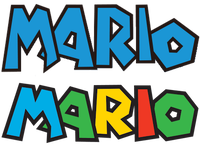


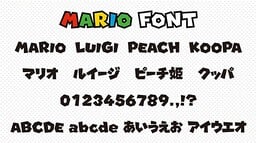



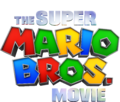
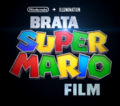


![Lettering seen in the May 2023 game update trailer for the Game Boy Advance - Nintendo Switch Online application[2]](https://mario.wiki.gallery/images/thumb/4/45/GBA-NSO_trailer_2023-05_screenshot_-_available_may_26.jpg/120px-GBA-NSO_trailer_2023-05_screenshot_-_available_may_26.jpg)



